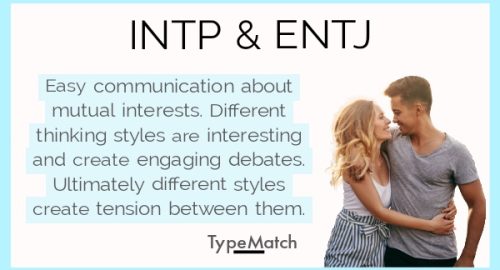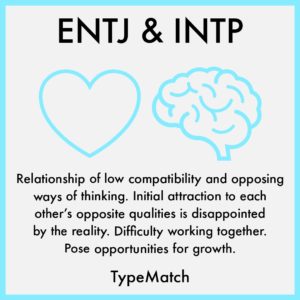INTP ENTJ Relationship
Are INTP and ENTJ Relationships Compatible?
INTP & ENTJ relationships are called shadow pairs because the two partners have the same firm and weak traits but opposite values. In the TypeMatch dating and friendship app, we rate this relationship a low compatibility score. Below we will explain the positives and negatives of this type of relationship as well as our advice.
What Are Shadow Types?
To get technical for a minute, shadow types have opposite cognitive functions in the same order. So, they are like a mirror image of each other. For each of the 16 personality types, their shadow is all of the functions of their mind that they devalued and repressed. This is the price each of us pays for specialization in our minds. We cannot look at every single perspective at once, our minds have to prioritize some over others. These become our cognitive preferences, which is what determines our personality types. Let’s look at the cognitive functions of the INTP and ENTJ.
INTP- Ti, Ne, Si, Fe
ENTJ- Te, Ni, Se, Fi
Since the functions are in the same order but flipped in terms of their extraversion or introversion, this means that the two types are each other’s shadows and see the world from a completely opposite perspective.
Attraction
INTPs and ENTJs are often attracted to one another because of their physical qualities. For example, they may be drawn to the beauty of their partner’s eyes. Many people in these INTP & ENTJ Relationships report feeling attracted to their partner’s opposite qualities, but find the other person is not really the way they thought.
INTPs and ENTJs are notorious for having a difficult time dating. They’re hard to read and just plain busy. So, they’re both one of the types that people need the most help understanding. If you need help dating an INTP or ENTJ, download our e-books to find out what these types want you to know about dating them: INTP dating guide , ENTJ dating guide

Communication Compatibility
Relations between INTPs and ENTJs are often characterized by a mutual interest in a particular subject. Still, each partner’s approach to this shared interest is fundamentally different and incomprehensible to the other. Each person’s thinking style feels like a pleasant surprise at first. They are constantly reminded that the way their partner thinks is completely different from the way they do.
Overall, Partners generally appeal to one another’s style of behavior. INTPs and ENTJs like to debate and talk, and they usually feel comfortable. The more active person in the debate will share their opinions, while the less enthusiastic partner will offer commentary and corrections. Though their opposite ways of thinking are interesting, it can make it difficult to come to any agreements.
When alone, these two types can have many interesting one-on-one conversations. They may feel amazement and wonder at each other’s originality of thought. However, if a third person is present, the partners may start to argue against the other’s ideas and try to extinguish them. As a result, a sense of competition starts to grow.
For relationships between INTPs and ENTJs, it is best to avoid discussion in front of a lot of people. There is room for correction and enrichment in a small circle with new factual information. Still, if relations become more extraverted, arguing against each other’s propositions without substantiation will begin.

INTP and ENTJ Relationship
INTPs and ENTJs often find it challenging to maintain a stable relationship due to the constantly frustrating interpersonal dynamic. In the beginning, individuals are likely to act through their 8th (demon) functions, which the other person entirely accepts. Then, In trying to get to know the other person closely, partners are frustrated and unsettled in their attempts by the other person’s unexpected and out-of-sync reactions.
It’s best, then, for both partners to be patient and understand that this is just a part of the initial phases of getting to know somebody. In that case, they will eventually be able to work through it and come to a more comfortable place where they can better understand each other.
Different thinking styles which result from opposite personality traits can be a source of tension and admiration between the two. The introvert and extrovert often find themselves drawn to each other despite their differences.
However, INTP and ENTJ relationships can be challenging, as each person tends to extinguish the other’s natural energy and activity level. The J partners often have to get used to each other’s quirks and how they think. It can be lengthy, especially if married, because they also have to deal with sexual differences and expectations. Most of the time, these differences aren’t significant, and there is potential for some severe hurt depending on the circumstance.
Partnership
Conflict is inevitable if two people who are complete opposites have to live or work together. Since INTPs and ENTJs seem to vibrate in opposite phases, emotional closeness is thwarted by their partner’s seemingly sudden changes in behavior.
When INTPs and ENTJs are in a relationship, they can clearly see and expose each other’s flaws. Because they can see each othe’rs weaknesses so clearly, they can predict the success of failure of each other. While meticulously counting their partner’s flaws, each one forgets about the vulnerability of their own position – their weaknesses which their partner aslo quickly sees. Thus, they make each other feel vulnerable and self-conscious about the areas in which they aren’t able to develop much skill.
The two should not approach each other emotionally – deep emotional grievances will tear them apart. The accusations of not thinking things through, skepticism, and criticism are too common.
Conversely, in business and projects, INTPs and ENTJs tend to have a pretty good understanding of what the other person will do in any given situation. They work well together because they’re willing to change things when necessary. It can be a bit boring, though, especially if they can always explain why they act the way they do.
To keep things fresh, INTPs and ENTJs must engage in friendly debates and discussions about the things happening around them.

Our Advice for INTPs and ENTJs
In INTP & ENTJ relationships, when people are around, they tend to develop arguments and challenge each other’s views. Communicating comfortably with a small group of friends or associates is key to maintaining healthy relationships.
It’s essential to learn to accept criticisms of each other knowingly and to learn from them. In this way, the relationship can be mutually beneficial in helping each one grow and avoid mistakes. If emotions are running high, it’s best to take a step back and spend some time alone before trying to resume communication.
Also, the two should do new things together and learn new things so that they have new topics of conversation for when they are ready to discuss. To avoid constantly getting frustrated, partners must have a high level of personal, social, and cultural development.
Furthermore, the more agreements they are able to reach leads to a more tolerant attitude towards each other’s behavior. In other words, INTPs and ENTJs are more likely to be okay with each other’s quirks and idiosyncrasies when they feel like they’ve reached a compromise.
More Resources for INTPs & ENTJs
Sources:
A.V. Bukalov, G. Boiko, “Why Saddam Hussein made a mistake, or what is Socionics”
Ekaterina Filatova “Art of understanding yourself and others”
Eugene Gorenko, Vladimir Tolstikov, “Nature of self”
I.D. Vaisband, publications on Socionics
Laima Stankevichyute “Intertype relations”
O.B. Slinko, “The key to heart – Socionics”
R.K. Sedih, “Informational psychoanalysis”
Sergei Ganin
Valentina Meged, Anatoly Ovcharov
V.V. Gulenko “Criteria of reciprocity”
V.V. Gulenko, A.V. Molodtsev, “Introduction to socionics”







